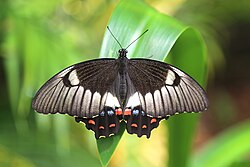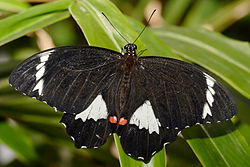Papilio aegeus
| Orchard swallowtail butterfly | |
|---|---|
 |
|
| Female, Cairns, Queensland | |
 |
|
| Male, Melbourne Zoo | |
| Scientific classification | |
| Kingdom: | Animalia |
| Phylum: | Arthropoda |
| Class: | Insecta |
| Order: | Lepidoptera |
| Family: | Papilionidae |
| Genus: | Papilio |
| Species: | P. aegeus |
| Binomial name | |
|
Papilio aegeus Donovan, 1805 |
|
| Subspecies | |
|
|
 |
|
| Range of orchard swallowtail
P. a. aegeus; P. a. ormenus
P. a. aegeus temporary range
|
|
| Synonyms | |
|
|
Papilio aegeus, the orchard swallowtail butterfly or large citrus butterfly is a species of butterfly from the family Papilionidae, that is found in eastern Australia and Papua New Guinea.
The larvae of this species are sometimes considered a pest, due to their feeding on citrus leaves in suburban gardens.
Both male and female have black forewings with a white stripe, though there is more white overall on the female forewing. The hindwing is again black, and there is a white swath through the middle. Here the markings differ in that the female has chains of red to orange and blue crescents toward the edge. The markings on the underside are similar to those on top. The body is black. The wingspan is about 140 millimetres (5.5 in) in females and 120 millimetres (4.7 in) in males, making it rather large overall and the largest butterfly commonly seen in at least part of its range.
Despite being a swallowtail, which group derives its name from the distinctive tails on the hindwing, this characteristic is entirely absent.
Papilio aegeus can be found in every state in Australia except Tasmania. Western Australia has well established colonies in the Albany region. There are enthusiasts who are promoting the controlled propagation of eggs and caterpillars in Western Australia, but it is generally found in eastern Australia. It is especially common in Queensland and is the largest butterfly commonly found in Brisbane where there are many citrus trees, on which the larvae feed. During summer, the distribution is temporarily extended to Victoria.
The subspecies P. a. ormenus is found on Papua New Guinea and Thursday Island.
A differentiating feature between males of P. a. aegeus and P. a. ormenus is that P. a. aegeus males have a red spot on the above side of each hindwing, which is absent in the males of P. a. ormenus.
...
Wikipedia
